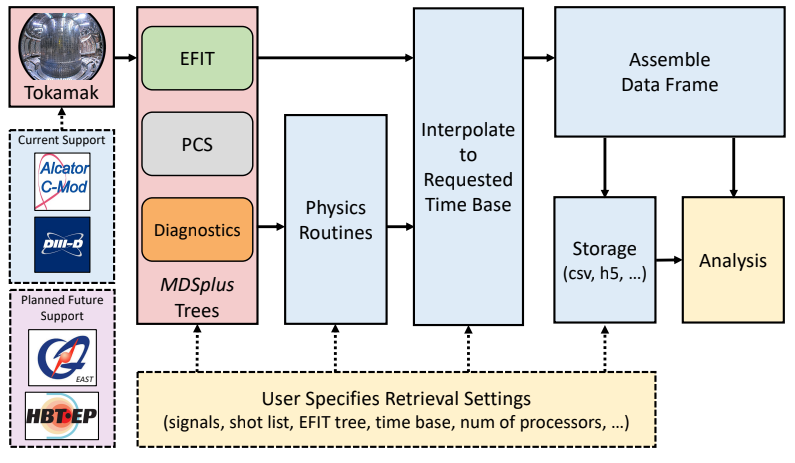Open and FAIR Fusion for Machine Learning Applications
Three-year grant sponsored by the Department of Energy (DOE) Office of Fusion Energy Sciences (FES).
A multi-institutional collaboration to develop a Fusion Data Platform for Machine Learning applications using Magnetic Fusion Energy (MFE) data.
MFE devices participating in this research are Alcator C-Mod, Pegasus-III, CTH and HBT-EP. An interoperable and publicly available library will be developed leveraging data from these devices. The library will have built-in pipelines for ML application design, allowing preservation of reproducible scientific results. Curated research products will be released through the newly designed platform, which will adhere to Findable, Accessible, Interoperable, Reusable (FAIR) and Open Science (OS) guidelines.


Disruption-py is now open source!
DisruptionPy is an interoperable open-source library for data access across different MFE devices. This library, developed in Python, contains built-in pipelines for processing and analyzing experimental data, allowing users to quickly, easily, and robustly design machine learning (ML) applications such as for disruption prediction and avoidance.

DisruptionPy makes it easy to retrieve tabular data from MDSplus databases efficiently. Users can create their own methods and/or use built-in methods that retrieve and derive a variety of important parameters from experimental data for disruption analysis. These methods are run across all provided sets of discharges (or shot ids), outputting tabular data in customizable formats.
DisruptionPy is open-source on Github. For citations, please head over to Zenodo.
ML/AI for Fusion Energy Summer School at W&M
An intensive 2-week summer school focused on undergraduate students with backgrounds in physics, engineering, computer science, applied mathematics and data science will be offered yearly at William & Mary. This summer course includes a close to equal distribution of traditional instruction and active projects. The traditional instructions provide daily 80 min instruction in 3 classes with a focus on computing, applied mathematics, machine learning and fusion energy. These classes are based on existing classes offered in data science at W&M, such as databases, applied machine learning, Bayesian reasoning in data science. These classes are then supplemented with classes focused on fusion energy for the applications the students will tackle during the hands-on component and for students’ summer research.
- The first edition of the Summer School occurred at W&M in June 2024.
- The second edition of the Summer School occurred at W&M in June 2025.
The third edition of the Summer School will take place in June 2026. For support and/or questions please write an email to wmsummerschool@gmail.com.

External collaborators
- N. Cummings, UKAEA.
- N. Murphy, Center for Astrophysics - Harvard & Smithsonian.
- A. Pau, EPFL SPC.
- J. Levesque, Columbia University.
and with the support of the International Atomic Energy Agency (IAEA).
In the news
- Fast-tracking fusion energy’s arrival with AI and accessibility
- William & Mary to lead machine learning efforts for nuclear fusion
- UW–Madison part of effort to advance fusion energy with machine learning
- FAIR data and inclusive science to enable clean energy
- Department of Energy Awards Grant to The HDF Group and Collaborators for Fusion Energy Data Management Tools